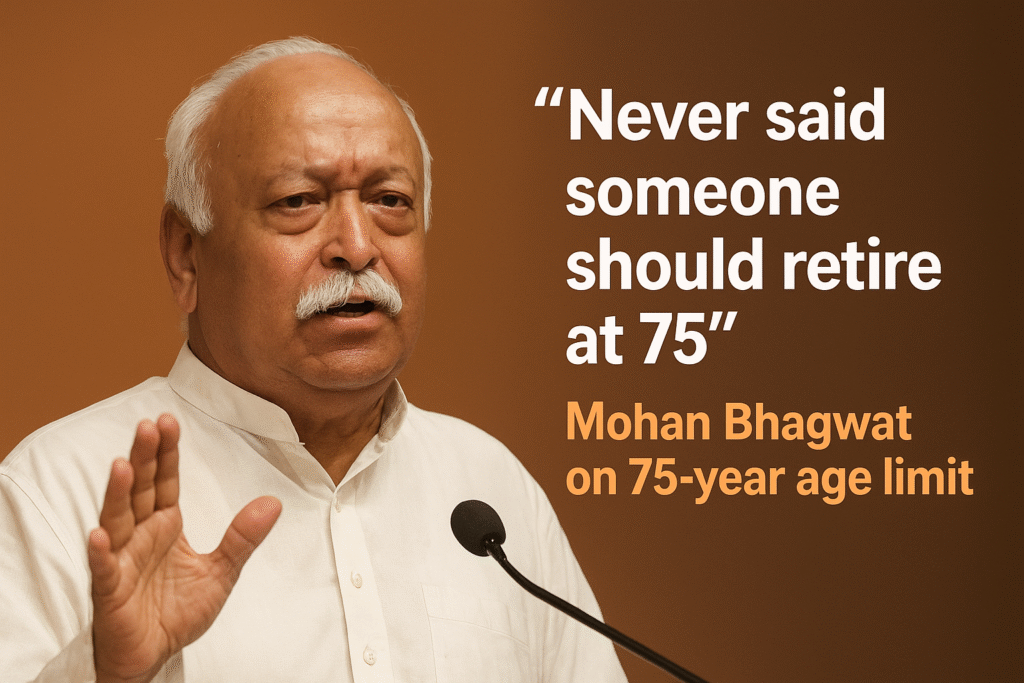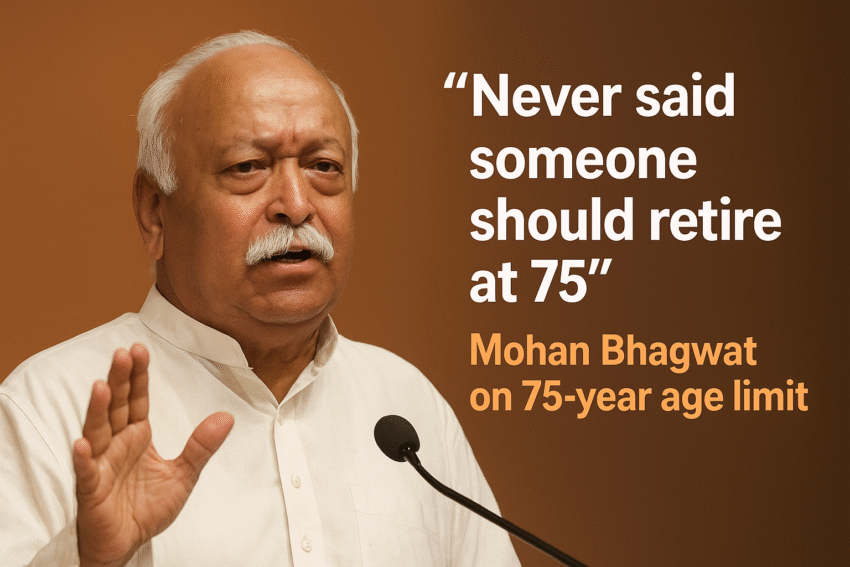
Mohan Bhagwat on 75-Year Age Limit, In a significant clarification that has caught national attention, Rashtriya Swayamsevak Sangh (RSS) chief Mohan Bhagwat on 75-year age limit made it clear that he never stated anyone should step down from active responsibilities after crossing that threshold. His remarks come amid ongoing political debates where age and leadership transitions have become hotly contested topics.
Mohan Bhagwat’s Clarification on Age and Leadership
Speaking at a public event, Mohan Bhagwat on 75-year age limit explained that while discipline and organizational principles are important, the idea of forcing retirement based purely on age is a misinterpretation of his earlier comments.
“I never said someone should retire at 75. In the Sangh, there is no such rule. The only guiding principle is the spirit of service, dedication, and ability to contribute,” Bhagwat clarified.
His remarks are seen as a subtle response to speculation in political and media circles that RSS leaders were advocating a fixed retirement age for politicians.
Why the 75-Year Debate Matters in Indian Politics
The issue gained momentum after several parties informally adopted the 75-year benchmark for leadership roles. Prime Minister Narendra Modi, for example, has emphasized generational change within the BJP, where leaders above 75 are often moved into advisory roles.
Against this backdrop, Bhagwat’s statement adds nuance to the debate. By saying that service should not be limited by age, the RSS chief has indirectly questioned the political narrative that equates age with efficiency.
RSS Standpoint: Service Beyond Numbers
For the Sangh, service is a lifelong commitment. Mohan Bhagwat on 75-year age limit reiterated that the RSS does not function based on political compulsions or corporate-style retirements. Instead, it values seva (service) and samarpan (dedication), regardless of whether a swayamsevak is 45, 65, or 85.
This approach resonates with the RSS philosophy that a person’s utility is measured by their capacity to contribute rather than a rigid age bar.
Political Interpretations of Mohan Bhagwat’s Statement
Experts note that Mohan Bhagwat on 75-year age limit could have political ripple effects. Many senior leaders across parties, including the BJP, have crossed the 75-year threshold but continue to remain active in different capacities.
- For the BJP, this clarification may provide breathing room for veterans who wish to remain politically relevant.
- For the opposition, it signals that the RSS is not strictly aligned with the “age-bar narrative” propagated in recent years.
Leadership vs. Experience
The debate over leadership transitions in India often pits youth vs. experience. While younger leaders bring energy and fresh ideas, veterans bring wisdom and stability. By clarifying his stance, Mohan Bhagwat on 75-year age limit seems to be urging society not to discard experience in the pursuit of generational change.
Broader Message Beyond Politics
Interestingly, Bhagwat’s remarks also extend beyond political corridors. In professional, academic, and social fields, the question of retirement age often sparks debate. Should capable individuals be sidelined just because they hit a numerical milestone?
By rejecting the rigid 75-year rule, Bhagwat has opened a broader conversation about age, contribution, and relevance in society.
Expert Voices on the 75-Year Debate
Political analyst Ramesh Tiwari observed:
“Mohan Bhagwat on 75-year age limit sends a powerful message. It challenges the notion that age defines ability. At a time when many global leaders are above 70, India’s debate on fixed retirement appears restrictive.”
Conclusion
The clarification from Mohan Bhagwat on 75-year age limit is both timely and impactful. It not only counters misinterpretations but also places emphasis on service over age, dedication over numbers, and contribution over retirement rules.
In an era where political and social narratives are rapidly changing, Bhagwat’s words serve as a reminder that true leadership is measured not by years lived, but by years of meaningful service.

